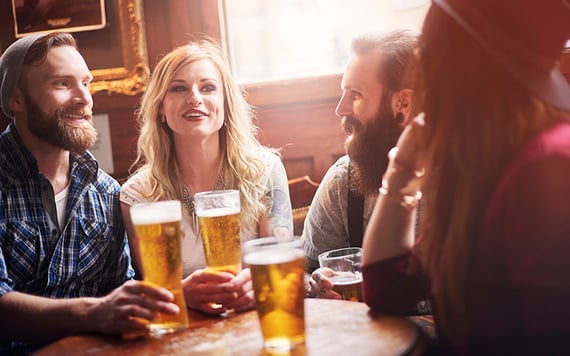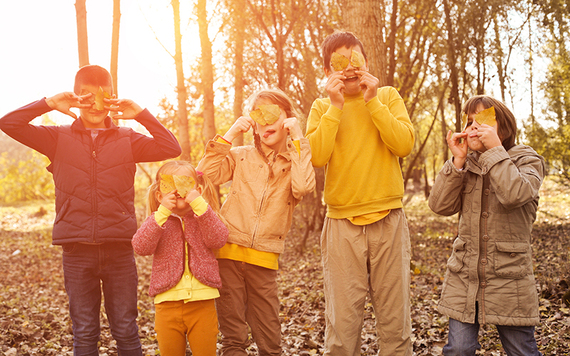Irish friendliness is renowned around the world but by God, there are rules and etiquette to be followed.
Where does the legendary Irish hospitality come from? It’s hard to say, perhaps it's the reflex of a people used to having their worldly goods snatched away by fate or colonial powers. Maybe it’s innate. One thing for certain is that it’s not a myth.
If you haven’t experienced Irish hospitality before and you’re making your first trip there this year you might want to familiarize yourself with some of the basics. Here are ten unbreakable rules to help you on your way.
Eat the Mikados
To be invited into an Irish home is a rare privilege, if you are fortunate enough to be asked do not dismiss what they place before you. Eat the fig rolls. Express interest in the mikados. Look as if you are grateful.
The First Law of Thermodynamics states that heat is a form of energy. The First Law of Irish Hospitality is "For The Love Of God, Would You Eat What Is Placed Before You."
On pain of death do not high-handedly wave the biscuits away because you’re hyperglycemic. No one in Ireland even knows what that is.
Praise the host

Praise be all might hostess!!... Praise her / him for God's sake!
Elaborately praising the host is an Irish tradition that stretches back through the Middle Ages into prehistory and possibly to the dawn of time (the island of Ireland is impossibly old). You may secretly feel the sandwiches were too dry, or too small, or too bland, but you will speak of them as though they were manna that rained from heaven. Sing your hosts' praises at every Irish social gathering as though you have never been so indulged in your life before and you will unlock the first key to real Ireland: unspoken but fiercely felt pride.
Pints… It’s your round

Does someone need a drink? It's your round...don't question it.
It is always your turn to buy a round of drinks at the pub. Always. There is never a time when it’s not. Race to pay the bill. Run. Hear of no aid in the endeavor. One slip, one millisecond of hesitation in this regard, and it will be over for you in Ireland forever. Irish people are very keen observers of the time it takes other people to perform social tasks. Don’t encourage them.
Sure, it’s grand
Whatever happens, whether the roof collapses or the room is suddenly engulfed in flames, the only proper Irish response to any vicissitude of fate is that it’s “grand.” Your offspring can be run through with swords, your worldly belongings purloined and you yourself be sent out to sea in a leaky vessel, but Irish people will take serious offense if you describe any of this as anything other than “grand.” Nothing is any trouble, no behavior is any surprise, and nothing life can throw at you can disturb your equilibrium. Got it? “I’m grand” equals “I wouldn’t dream of upsetting you with a request/observation/complaint.” It cannot be stressed how important this is to learn.
Don’t mention the Brits

Sorry? What?! Did you bring up the Brits?
There is never a good time to mention the British and their centuries-long campaign of mayhem, murder and exploitation, but if you must do not do so at the Irish dinner table.
Dinner tables have rules, you’re expected to sit at them, meaning if you mention Oliver Cromwell you will have captured rather than captivated your audience. It’s not big, it’s not kind and it’s not clever to bait the Irish with tales of their oppression. Especially do not ruminate over or about potatoes. Commit this to memory.
Big family?

Yeah! We've a big family! Wanna take us on?!
Irish people traditionally have big families. This arose from the ban on any form of contraceptive and the urgent need to put as many hands on deck as possible to keep the ship afloat. This means that Irish people conceptualize family differently to other nations. They filed them in the way other nations filed sports teams. Whilst you are secretly condemning their fertility they are anxiously plotting their next goal.
Don’t be disobliging

Have manners...or there will be consquences.
There’s a near-religious quality to Irish hospitality, which is why those who fail to offer it are considered lost to both God and redemption. Most Irish people really do believe in the parable of the Good Samaritan, since so the national psyche contains potent tribal memories of privation and want.
Joking aside, take this fact especially seriously. The worst thing you can do in Ireland, the social faux pas to beat them all, is to look disobliging or ungrateful. Act like this and whether they tell you or not you will offend an Irish person to their marrow bones. It’s amazing how few tourists grasp this basic social contract: have manners or brace yourself.
How do you feel?

I'm sorry did you just ask an Irish male about emotions? #Fail!
If you want to clear a room full of Irishmen, ask them how they feel. Irish men don’t know how they feel. They intuit it from consultation with the sky, their past, the ache that they all secretly carry, and the torch they carry too.
It is never a good idea to ask an Irishman to divulge all of this within a few hours of first meeting him. Rule of thumb, if he wants you to know he’ll tell you. If he doesn’t he never will. You should also not mistake the volubility of Irish women for communication. The same rules actually apply.
Know when to go

You've stayed long enough! Know when to leave.
Irish people will tell you you’re welcome long after almost every other nation. Lookit, it’s no trouble. Sit where you are. Sure don’t they have taxis till all hours? Sure you can stay the night, you might as well. Only the truly socially maladroit test the patience of an Irish household. If you visit and you’re not related to your host have an escape plan.
Notice and appreciate everything
When you first visit Ireland the experience can be so charming that you can forget that it’s unique. Keep your thinking cap on, take nothing for granted and notice and appreciate just how differently they run the place. You’ll be looked at with keen interest, you’ll be asked for your opinion in a way you rarely are, and you’ll be welcomed in a way that will surprise you. The thing is to notice and appreciate the differences. Only those who do are ever welcomed back.

* Originally published in 2017, updated in June 2023.




Comments